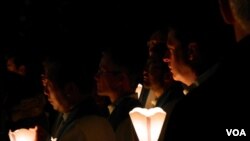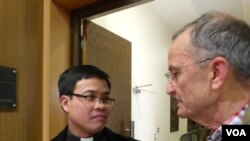PARIS —
The work of missionary priests and nuns seems more dangerous than ever, at least from statistics showing killings of missionaries doubled last year. Christian missionaries have faced danger for centuries, but the nature of the threat they face is very different today, as is the context in which they operate. These changes can be seen in the challenges facing one of France's oldest Catholic missionary societies.
In a small church in downtown Paris, family and friends have gathered to bid goodbye to the latest graduates of the Roman Catholic Foreign Missions Society of Paris. The young priests are heading off to challenging and sometimes risky assignments in Asian countries like China and Vietnam. Unlike other jobs, this one is for life.
Will Conquer, 24, still has a few years of training before he can join the departing missionaries. He's one of 27 seminarians in training at the Missions Society.
"I spent a year in Vietnam three years ago, working for the Catholic Church there. I saw a church that is on fire for Christ, on fire for the mission, on fire for freedom and justice [in] this world. ... My call is to go back to Asia and to live with the church in Asia," said Conquer.
But serving that calling can be risky. The Rome-based Fides news agency reported that 22 missionaries - priests, nuns and laymen - were killed last year, nearly twice as many as in 2012. Most of the deaths took place in Latin America, during robberies and other petty crimes that turned into murder. Other missionaries have been abducted in places like Syria and Democratic Republic of Congo. Their whereabouts remain uncertain.
Missionary work has always been dangerous. Hundreds of Catholic and Protestant missionaries were killed preaching the gospel in the Americas, Africa and Asia in years gone by, and others died of disease. The Mission Society's superior general, the Reverend Georges Colomb, said that until the 20th century, a missionary priest usually died before reaching the age of 40.
The society has a special "hall of martyrs" honoring its priests who died in violent circumstances.
Colomb said his priests face problems today in many countries. Getting a visa as a missionary is difficult if not impossible in places like Malaysia, China and Vietnam, so many priests travel as students, teachers or even tourists.
Young people join knowing they will live in countries where the Catholic Church and community are sometimes persecuted, where poverty is dire, and where other religions and traditions dominate. They want to prove themselves.
Founded 350 years ago, the Foreign Missions Society is one of the oldest missionary groups in France. Its 240 priests work in more than a dozen countries, mostly in Asia. They are among the estimated 3,000 priests, nuns and laypeople who serve the French Catholic Church overseas - a number significantly lower than in the past, reflecting Europe's secular trend.
The Reverend Jean Forgeat, deputy director for missionary activities at the Council of French Bishops, said the missionary task is unique. Missionaries have always promoted faith and the gospel, Forgeat said, but they also work for human development.
Professor Dries Vanysacker said missionaries today face new hazards that underscore the dramatically different context in which they now operate. Vanysacker, an expert on missionaries at the Catholic University of Leuven, in Belgium, said missionaries today are in greater danger than those in the past.
"I would not say it's less dangerous to be a missionary today than 100 years ago. To the contrary. I think they're more involved with other people than before, and I think that's a more dangerous way of living than 100 years ago. Because then they were much more protected, by more powerful means, than today," said Vanysacker.
In the past, Vanysacker said, missionaries were closely associated with the colonial powers dominating the countries where they worked. They often lived in big, well-guarded compounds. They were often seen as instruments of colonialism, and targeted as such.
"Nowadays, they have a more humble presence within some regions... They are living in the villages, they are living in a simple house. They are not living in a protected, big building," said Vanysacker.
Last year Reverend Georges Vandenbeusch, a 42-year-old French priest, was kidnapped from his parish in northern Cameroon by Islamist militants. He was held for six weeks before being released in late December.
French missionaries who served in Algeria during the civil war there in the 1990s were not so lucky. Eighteen of them died during a bloodbath that killed upwards of 100,000 people. Among them were seven Trappist monks living in the Algerian village of Tibhirine.
Forgeat at the Bishops' Council said the monks chose to stay in Algeria despite the danger. They were brutally slaughtered. Their presence has not been forgotten. Many Algerians continue to visit their abandoned monastery to pay their respects to the monks' memory.
Despite the killings, experts have said today's missionaries are in general better adapted to the challenges facing them. The Catholic Delegation for Cooperation in Paris, for example, conducts training programs for missionaries that cover political, cultural and security issues.
Charles Le Gac de Lansalut, who heads the organization, said missionaries a century ago were not well prepared to adapt to new cultures. That's not the case today.
The Foreign Missions Society in Paris also prepares its priests for their new lives. Three years of in-country language training, for example, is mandatory.
At a going-away ceremony for new missionaries, Pierre Nguyen, a 34-year-old priest heading for South Korea, said he is aware of the political and cultural context he will work in.
Nguyen sees his task as helping to build bridges between his flock in Korea and Catholics worldwide. He said he will face the challenges ahead with serenity.
At the end of the farewell service, the priests file into the mission's vast garden. They carry small candles to light their way in the night, just as they hope their faith will light their way later on.
In a small church in downtown Paris, family and friends have gathered to bid goodbye to the latest graduates of the Roman Catholic Foreign Missions Society of Paris. The young priests are heading off to challenging and sometimes risky assignments in Asian countries like China and Vietnam. Unlike other jobs, this one is for life.
Will Conquer, 24, still has a few years of training before he can join the departing missionaries. He's one of 27 seminarians in training at the Missions Society.
"I spent a year in Vietnam three years ago, working for the Catholic Church there. I saw a church that is on fire for Christ, on fire for the mission, on fire for freedom and justice [in] this world. ... My call is to go back to Asia and to live with the church in Asia," said Conquer.
But serving that calling can be risky. The Rome-based Fides news agency reported that 22 missionaries - priests, nuns and laymen - were killed last year, nearly twice as many as in 2012. Most of the deaths took place in Latin America, during robberies and other petty crimes that turned into murder. Other missionaries have been abducted in places like Syria and Democratic Republic of Congo. Their whereabouts remain uncertain.
Missionary work has always been dangerous. Hundreds of Catholic and Protestant missionaries were killed preaching the gospel in the Americas, Africa and Asia in years gone by, and others died of disease. The Mission Society's superior general, the Reverend Georges Colomb, said that until the 20th century, a missionary priest usually died before reaching the age of 40.
The society has a special "hall of martyrs" honoring its priests who died in violent circumstances.
Colomb said his priests face problems today in many countries. Getting a visa as a missionary is difficult if not impossible in places like Malaysia, China and Vietnam, so many priests travel as students, teachers or even tourists.
Young people join knowing they will live in countries where the Catholic Church and community are sometimes persecuted, where poverty is dire, and where other religions and traditions dominate. They want to prove themselves.
Founded 350 years ago, the Foreign Missions Society is one of the oldest missionary groups in France. Its 240 priests work in more than a dozen countries, mostly in Asia. They are among the estimated 3,000 priests, nuns and laypeople who serve the French Catholic Church overseas - a number significantly lower than in the past, reflecting Europe's secular trend.
The Reverend Jean Forgeat, deputy director for missionary activities at the Council of French Bishops, said the missionary task is unique. Missionaries have always promoted faith and the gospel, Forgeat said, but they also work for human development.
Professor Dries Vanysacker said missionaries today face new hazards that underscore the dramatically different context in which they now operate. Vanysacker, an expert on missionaries at the Catholic University of Leuven, in Belgium, said missionaries today are in greater danger than those in the past.
"I would not say it's less dangerous to be a missionary today than 100 years ago. To the contrary. I think they're more involved with other people than before, and I think that's a more dangerous way of living than 100 years ago. Because then they were much more protected, by more powerful means, than today," said Vanysacker.
In the past, Vanysacker said, missionaries were closely associated with the colonial powers dominating the countries where they worked. They often lived in big, well-guarded compounds. They were often seen as instruments of colonialism, and targeted as such.
"Nowadays, they have a more humble presence within some regions... They are living in the villages, they are living in a simple house. They are not living in a protected, big building," said Vanysacker.
Last year Reverend Georges Vandenbeusch, a 42-year-old French priest, was kidnapped from his parish in northern Cameroon by Islamist militants. He was held for six weeks before being released in late December.
French missionaries who served in Algeria during the civil war there in the 1990s were not so lucky. Eighteen of them died during a bloodbath that killed upwards of 100,000 people. Among them were seven Trappist monks living in the Algerian village of Tibhirine.
Forgeat at the Bishops' Council said the monks chose to stay in Algeria despite the danger. They were brutally slaughtered. Their presence has not been forgotten. Many Algerians continue to visit their abandoned monastery to pay their respects to the monks' memory.
Despite the killings, experts have said today's missionaries are in general better adapted to the challenges facing them. The Catholic Delegation for Cooperation in Paris, for example, conducts training programs for missionaries that cover political, cultural and security issues.
Charles Le Gac de Lansalut, who heads the organization, said missionaries a century ago were not well prepared to adapt to new cultures. That's not the case today.
The Foreign Missions Society in Paris also prepares its priests for their new lives. Three years of in-country language training, for example, is mandatory.
At a going-away ceremony for new missionaries, Pierre Nguyen, a 34-year-old priest heading for South Korea, said he is aware of the political and cultural context he will work in.
Nguyen sees his task as helping to build bridges between his flock in Korea and Catholics worldwide. He said he will face the challenges ahead with serenity.
At the end of the farewell service, the priests file into the mission's vast garden. They carry small candles to light their way in the night, just as they hope their faith will light their way later on.










